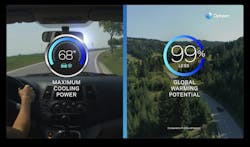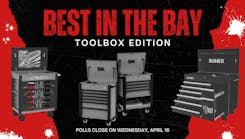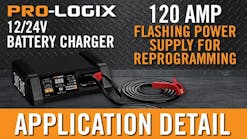Recent data puts the U.S. auto repair industry at more than 160,000 businesses, with 70 percent of these being independently owned shops. These “independents” take in approximately 75% of aftermarket business. Moreover, a 2023 study revealed that repair visits to dealerships declined by 5% between 2021 and 2023. Independent, locally owned shops make up the fabric of the automotive aftermarket and are trusted by consumers to keep their vehicles running reliably, safely, and efficiently.
As mobile air conditioning continues its transition from the legacy R-134a refrigerant to the lower global warming potential (GWP) R-1234yf, independent repair and maintenance shops have a significant role to play in servicing vehicles. Being able to do so also presents small and medium-sized shops a tremendous opportunity to remain competitive and potentially gain business from shops that are not YF-ready.
A quick R-1234yf refresher
R-1234yf — a hydrofluoroolefin (HFO) delivering zero ozone depletion potential (ODP) plus a low (< 1 GWPAR5) GWP — is the industry’s solution for national and global regulations phasing out the use of hydrofluorocarbons (HFCs), including R-134a. In the U.S., under the American Innovation and Manufacturing (AIM) Act, the industry is experiencing a steady phasedown of HFC refrigerants. In addition, the EPA’s Significant New Alternatives Policy (SNAP) has listed R-1234yf as “acceptable with conditions” for mobile air conditioning systems in newly manufactured passenger cars, light-duty trucks, medium-duty passenger vehicles, heavy-duty pickup trucks, complete heavy-duty vans, and heavy-duty nonroad vehicles. All these influences are driving expanded use of R-1234yf.
There are more than 95 million R-1234yf-charged vehicles on U.S. roads, and an estimated 20% of current AC service business coming in is for R-1234yf. That percentage will rise as more R-1234yf vehicles roll off the assembly line and come out of warranty. In reaction to regulatory phasedowns of R-134a, and in pursuit of strong business strategies, a growing number of shops of all sizes are embracing the need to service vehicles charged with the new-generation R-1234yf refrigerant.
Addressing the needs, and challenges, of today’s independent shops
For many independent aftermarket service shops, going “all in” on equipment and product for servicing R-1234yf vehicles may not be financially feasible — or even necessary. If you fall into this category, it doesn’t mean you have to watch business go to a larger shop down the street. Chemours, for example, offers our R-1234yf refrigerants (Opteon YF) in packaging designed for shops doing approximately 10 services or fewer. All options offer a low cost of entry and are made in the USA:
- 28-ounce self-seal can: provides a cost-effective option for multiple-use charges, or for servicing vehicles with greater charge sizes (such as SUVs and trucks)
- 12-ounce self-seal can: provides a cost-effective option for single-use charges
- 12-ounce self-seal can with reusable charging hose: offers a quick-connect coupler for easy low-side port connection
- 12-ounce self-seal can with leak detect
Independent shops can also offer service of R-1234yf vehicles without overtaxing your technicians, schedules, or the bottom line. With today’s challenges ranging from shortages in the labor market to a society that expects more in less time, R-1234yf offers a comprehensive solution. Consider:
- With a Chemours all-in-one Opteon YF recharge kit, you can service a vehicle’s AC in mere minutes.
- If you purchase less than 2 pounds of R-1234yf, you do not need a license. (Working with 10- and 25-pound single-use recyclable requires a Section 609 Technician Certification.)
- For the most part, working with R-1234yf is “business as usual.” However, all technicians must be trained in the proper and safe handling and use of the R-1234yf because it is an A2L mildly flammable refrigerant.
- R-1234yf optimizes performance and sustainability, providing maximum cooling power while reducing GWP by 99 percent in comparison to the legacy R-134a.
How to service R-1234yf vehicles
To help your independent shop get rolling on servicing R-1234yf vehicles — and to demonstrate how fast and easy it can be — here’s an overview of the steps needed with an Opteon YF recharge kit:
- Check the SAE label under the hood to ensure the car uses R-1234yf. If there is no label, refer to the owner’s manual.
- Start the vehicle’s engine, set the AC to maximum cool, set the fan to the highest setting, and make sure recirculation mode is on.
- Put on safety gloves and protective eyewear.
- Locate the low-side AC service port.
- Shake the can of Opteon YF well and attach the blue connector on the hose to the low-side service port.
- Check the pressure gauge on the hose. If it’s in the blue area, the pressure is low.
- Holding the can upright, turn the black dispensing top to the unlock position, push the dispensing top to release refrigerant, and continuously rotate the can from the 12 o’clock to the 3 o’clock position.
- Continue filling until the pressure gauge enters the green area; avoid the red area, which indicates overcharging.
- Remove the blue connector, reattach the cap before closing the hood, and lock the dispensing top for storage of any remaining refrigerant.
As demand for service increases, shops of all sizes can retain and possibly even grow business by equipping themselves to keep R-1234yf jobs in-house. By being the local shop that has the supply, correct tools, and know-how to handle R-1234yf vehicles, you should be able to service your current R-1234yf customers as well as customers of other area shops that aren’t properly prepared.
To learn more about R-1234yf, view product information bulletins, download engineering property sheets, and more, visit opteon.com/YF.




